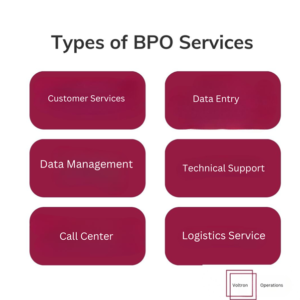In today’s rapidly evolving business landscape, companies are continuously searching for ways to stay competitive, reduce costs, and focus on their core competencies. One strategy that has proven highly effective is Business Process Outsourcing (BPO). Whether it’s customer service, data entry, or technical support, BPO allows businesses to delegate specific operations to external providers. This not only optimizes efficiency but also ensures that the business can leverage the expertise and tools of specialized service providers.
In this guide, we will explore several examples of BPO services and delve into the key benefits that make outsourcing an attractive option for businesses of all sizes.
What is Business Process Outsourcing (BPO)?
Business Process Outsourcing (BPO) is the practice of delegating particular business functions or operations to external service providers. These operations can range from customer-facing roles, such as call center management, to back-office functions like data processing. By outsourcing these tasks, companies can concentrate on their primary business activities while relying on external experts to handle other critical, yet non-core, functions.
Examples of Business Process Outsourcing
Outsourcing has become an integral part of business strategy across various industries. Here are some prominent examples of BPO services:
Customer Service
Customer service is among the most frequently outsourced business functions. Businesses partner with BPO companies to manage their customer inquiries, complaints, and feedback through call centers, chat support, or email communication. This ensures that customers receive timely and professional support, enhancing customer satisfaction and loyalty.
Data Entry
Data entry is a labor-intensive task that can be efficiently handled through outsourcing. BPO companies provide data entry services, handling everything from manual data input to data processing. This not only saves time but also reduces errors and ensures data accuracy, which is crucial for informed decision-making.
Inventory Management
Outsourcing inventory management allows businesses to maintain accurate stock levels without the need for an in-house team. BPO providers offer real-time monitoring, stock replenishment, and order fulfilment services. This helps companies avoid stockouts or overstocking, ensuring a smooth supply chain operation.
Telecommunication
Telecommunication services, such as managing inbound and outbound calls, telemarketing, and customer relationship management, are often outsourced to specialized BPO providers. These companies employ skilled professionals and advanced technology to handle large volumes of calls efficiently, allowing businesses to maintain high service standards without straining internal resources.
Technical Support
Outsourcing technical support is particularly common in industries where customers rely on products or services that require ongoing assistance. BPO Services companies provide 24/7 support, troubleshooting, and maintenance services, ensuring that customers receive expert help whenever they need it. This not only improves customer satisfaction but also reduces the burden on in-house teams.

The Benefits of Business Process Outsourcing
Business Process Outsourcing offers numerous advantages that go beyond mere cost savings. Below are some of the key benefits that businesses can gain from outsourcing various operations:
Focus on Core Competencies
By outsourcing non-core activities, businesses can focus their resources and attention on what they do best. For example, a tech company can concentrate on product development while outsourcing customer support or administrative tasks. This strategic focus can lead to higher efficiency, innovation, and competitive advantage in the market.
Reduced Operating Costs
A primary reason companies opt for BPO is to reduce costs. Outsourcing enables businesses to tap into skilled labor at a significantly lower cost than maintaining an in-house team. Additionally, BPO Services provider are frequently based in regions with lower labor costs, enabling companies to lower their overall operating expenses without sacrificing quality.
Access to a Pool of Global Talent
BPO Services provider have access to a vast pool of skilled professionals from around the world. This global talent pool ensures that businesses can leverage specialized expertise without the need to recruit and train employees internally. Moreover, outsourcing allows companies to tap into diverse skill sets and cultural perspectives, enhancing their ability to serve a global customer base.
Dependence on BPO Companies for Advanced Digital Tools and Technologies
BPO providers invest heavily in the latest technologies and tools to deliver high-quality services. By outsourcing, businesses can benefit from these advanced digital solutions without having to make significant investments themselves. This includes everything from customer relationship management (CRM) systems to data analytics platforms, which can greatly enhance operational efficiency and decision-making.
Business Scalability through Expert Industry Knowledge and a Strong Workforce
Outsourcing enables businesses to scale operations up or down based on demand without the complexities of hiring or laying off staff. BPO providers deliver flexible staffing solutions, enabling companies to swiftly adjust to market dynamics or seasonal variations. This scalability is particularly beneficial for businesses experiencing rapid growth or those operating in highly volatile markets.
Customer Acquisition and Retention
Outsourcing customer-facing functions like sales, marketing, and customer support can significantly enhance a company’s ability to acquire and retain customers. BPO providers bring specialized skills and strategies that can improve customer engagement, boost brand loyalty, and ultimately drive revenue growth.

Conclusion
BPO Company has become an indispensable strategy for companies looking to optimize efficiency, reduce costs, and focus on core business activities. By outsourcing functions such as customer service, data entry, and technical support, businesses can benefit from the expertise and resources of specialized service providers. The advantages of BPO extend beyond cost savings, offering access to global talent, advanced technologies, and flexible scalability, all of which contribute to improved business performance and competitiveness in the market.
As businesses continue to navigate the challenges of the modern economy, the role of BPO in driving growth and innovation is likely to become even more significant. By strategically leveraging outsourcing, companies can position
